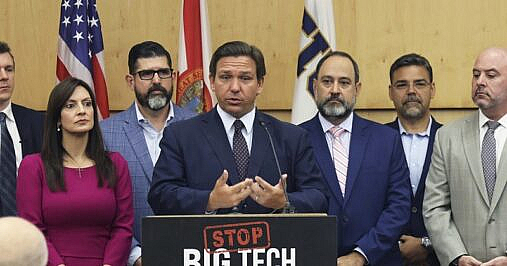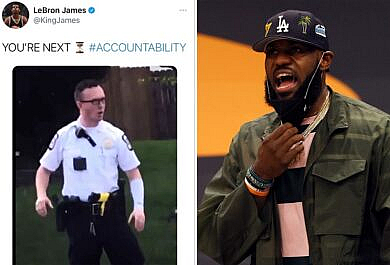Florida’s new law gives citizens the power to sue social media companies for discriminatory content moderation. Tech giants are feeling the heat in India and elsewhere.
Summary
Social media bans for politicians are now illegal in Florida after Gov. Ron DeSantis signed a bill into law that prevents “big tech oligarchs” from removing candidates from online platforms.
- The Stop Big Tech Censorship Act also allows users to sue a social media company if it is believed they are being discriminated against by the platform “inconsistently applying their content rules.”
- DeSantis said Florida is “the first state to hold the Big Tech companies to this standard of transparency and accountability”, though critics argue the law is a violation of a private company’s rights to run their platform without government interference.
- As the debate over Big Tech’s influence in culture, censorship, and the public square rages, some are warning the overtures by companies like Facebook inviting federal regulation will come with serious unintended consequences and heavier than expected government rules, similar to what happened with the railroad industry in the 19th century.
- Activists are calling for Facebook to drop its “Instagram for kids” project, saying a child-focused platform would be a risk to “their social development and mental health.”
- In India, social media companies are on the clock to implement corporate changes like adding ombudsman and compliance employees, risking a ban from use in India if they are not in compliance by May 26.
![]()
- Wired.com torched the Florida law in a one-sentence article: “Florida’s new social media legislation is a double landmark: It’s the first state law regulating online content moderation, and it will almost certainly become the first such law to be struck down in court.”
- CNN emphasized the legal fight Florida’s law is expected to bring while couching the story as part of a broader movement among Republicans to stop content restrictions on social media platforms. NBC News’ coverage of the law attempts to argue that conservatives have free rein on social media and “dominate” the lists of top links and engagement.
- Salon’s write-up of the Stop Big Tech Censorship Act mocked DeSantis and conservatives for “making a safe space” for Republicans online.
![]()
- The Federalist’s coverage was more positive-to-neutral, with most of its article containing direct quotes from Gov. DeSantis, including his characterization of the bill as “leveling the playing field between celebrity and citizen” by giving Floridians the ability to sue social media companies for “unfair” content moderation.
- OAN highlighted Utah Sen. Mike Lee’s efforts to “rein in” social media companies through “deceptive trade practices” laws with respect to a platform’s “content moderation policies.”
- In an example of how unevenly content restrictions can be applied, the New York Post highlighted criticism of Twitter from Borat star Sacha Baron Cohen who said the platform wasn’t doing enough to stop anti-Semitism. Cohen was referencing a report from the Anti-Defamation League that said the phrase and hashtag “Hitler Was Right”, in reference to the eradication of the Jewish people, had spread across Twitter and was not being taken down as hate speech.
Author’s Take
The question is where does a private corporation end and the public square begin. Conservatives are right in arguing Silicon Valley and social media giants enforce content moderation policies unevenly and in a way that targets conservative viewpoints are correct. We have seen it dozens of times. Ultimately, however, Facebook, Twitter, and others are still private companies.
On the other hand, when liberals say conservatives can simply “make their own” service, how exactly does that work? They did make their own social media platform, then Parler was taken off Apple’s app store (it has since returned after being coerced into changing their content moderation policy) and Amazon Web Services booted it from their servers. Theoretically you could create your own server, but what happens if liberal activists target and protest a conservative social media company’s internet service provider, or hashtag activism pushes other ISPs to block access?
Conservative or liberal, should it not concern you that the power to shape narratives, silence individuals, drive traffic and news coverage lies in the hands of literally less than a half-dozen companies?
© Dallas Gerber, 2021






